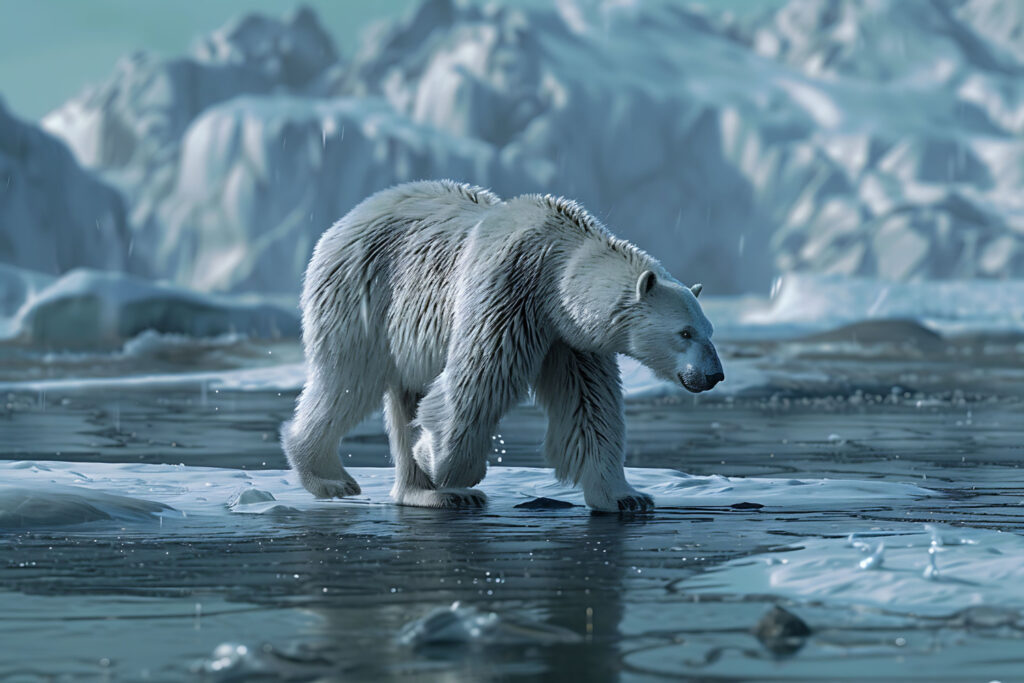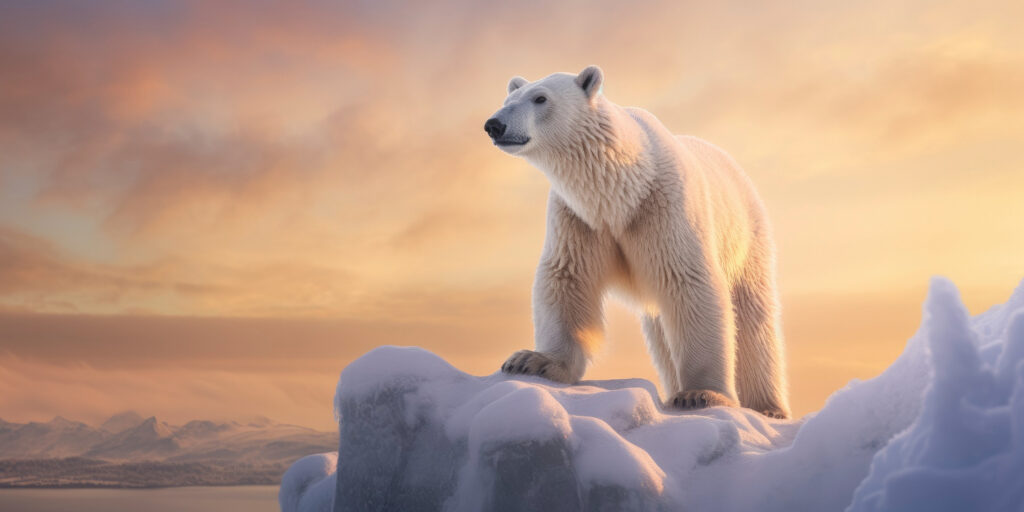
Polar bears, majestic creatures of the Arctic, have long captivated the human imagination. With their stark white fur and powerful presence, they embody the essence of the frozen north. Yet, beyond their physical allure, polar bears hold deep symbolic meanings across various cultures. They are not just survivors of the harsh climate but are seen as symbols of strength, endurance, and resilience.
In many traditions, these great white bears are revered as spiritual guides and protectors, representing purity and the ability to navigate through challenges. Their appearances in folklore and art highlight their importance in human storytelling and cultural heritage. As we delve deeper into the symbolism of polar bears, we uncover layers of meaning that resonate with our own experiences of survival and adaptation in a rapidly changing world.
Polar Bear Symbolism Overview

Polar bears are not just magnificent creatures of the Arctic; they hold deep symbolic meanings across various cultures. These animals symbolize strength and resilience and are considered spiritual guides and protectors.
Cultural and Spiritual Significance
In many indigenous cultures, polar bears represent wisdom and spiritual power. For example, the Inuit people regard them as powerful hunters worthy of respect and admiration. They believe polar bears possess the souls of ancestors and shamans, bridging the gap between the physical and spiritual worlds. Such beliefs emphasize the bear’s role as a teacher and guide in matters of survival and morality. Artwork and folklore featuring polar bears reflect their status as entities of reverence, often depicted as noble creatures that command the natural elements and challenge the harshness of their surroundings.
Environmental Symbolism
Polar bears also embody the urgent narrative of environmental change. They have become symbols of the fragile ecosystem of the Arctic, affected by climate change and melting sea ice. This symbolism serves as a stark reminder of the impact of global warming not just on polar bears but on the broader health of our planet. As ice caps diminish, so do the natural habitats of these bears, making them poignant figures in the discussion about sustainability and conservation. Their plight highlights the need for environmental stewardship to preserve not only their species but also the complex ecosystems they inhabit.
Historical Context of Polar Bear Symbolism

Polar bears, revered across various cultures, hold significant symbolic meanings that stem from their physical attributes and environmental roles. This section explores the depths of polar bear symbolism in historical contexts, underpinning their roles in indigenous beliefs and widespread myths.
Indigenous Beliefs and Myths
Polar bears are central to the belief systems of Arctic indigenous peoples. They are seen as the embodiment of the hunter’s prowess and the spirit of the Arctic wilderness. For the Inuit and other native groups, polar bears represent wisdom and spiritual power. They believe these animals are intelligent beings connected with the spiritual world, capable of straddling the boundaries between life and death. Shamans often invoke polar bears for protection and guidance.
Polar Bears in Folklore and Mythology
Folklore often imbues polar bears with attributes of nobility and purity. In Norse mythology, these creatures are depicted as the mounts of gods and heroes, emphasizing their stature and importance. Tales from the Sami, indigenous people of Scandinavia, illustrate polar bears as mighty and solitary creatures, often portrayed as the keepers of the northern realms. Their solitary nature in these stories mirrors their real-life solitary hunting habits on the icy Arctic sea ice.
You may also like:
- White Snake in Dream
- Woman Seeing Male Organ in Dream Biblical Meaning
- Black Widow’s Spiritual Meaning
- The Spiritual Meaning Behind Your Vivid Dreams
Polar Bear as a Spirit and Totem Animal

In many cultures, polar bears are revered not only for their physical attributes but also for their spiritual significance. They are often considered spirit and totem animals, embodying qualities that guide and inspire humans.
Characteristics and Traits
Polar bears, known for their power and solitude, symbolize strength and independence. Their persistence in the harsh Arctic environment reflects immense resilience and adaptability. As totem animals, they inspire individuals to be brave and self-reliant. Their thick white fur, which allows them to blend into their snowy surroundings, is symbolic of purity and camouflage—qualities that suggest a strategic approach to life’s challenges.
Spiritual and Emotional Impact
As spirit animals, polar bears exert a profound emotional impact on those they guide. They instill a calm yet potent sense of leadership and confidence, urging individuals to tackle life’s obstacles with grace and dignity. Emotionally, polar bears encourage introspection and personal growth, promoting a journey toward spiritual awakening and enlightenment. Their presence as a totem is often seen as a powerful protector, guiding souls through transformational periods with wisdom reminiscent of that attributed to ancestors and shamans.
What Do Polar Bears Mean in Dreams
Dreams featuring polar bears are rich with symbolism, often reflecting deep emotional and spiritual messages. These majestic creatures carry layered meanings tied to the symbolism discussed previously in various cultures.
Common Dream Scenarios Involving Polar Bears
Common scenarios in dreams about polar bears include interacting with them, witnessing them in their natural habitats, or being chased by them. Each scenario represents unique insights into the dreamer’s subconscious:
- Interaction: Dreaming of peacefully interacting with a polar bear suggests a connection with one’s inner strength or guidance through a challenging situation.
- Observation: Seeing a polar bear from a distance might indicate the dreamer is observing potential challenges or threats from a safe standpoint.
- Being Chased: If one is chased by a polar bear, it might symbolize running from rather than facing big challenges or fears that need confronting.
Interpretation of Polar Bear Dreams
The interpretation of polar bear dreams varies, but they generally symbolize power, survival, and spiritual guidance:
- Power and Dominance: Their presence in dreams can symbolize self-assurance or the need to assert oneself in challenging situations.
- Spiritual Guidance: Reflecting their role in indigenous cultures, polar bears in dreams could signal spiritual support or connection to ancestral wisdom, aiding in personal or emotional challenges.
- Survival and Adaptation: If facing or fighting a polar bear, it may represent one’s resilience and adaptability in overcoming difficult situations.
Thus, polar bear dreams are profound, often encouraging introspection and understanding of one’s inner landscapes and external realities.
Polar Bear Symbolism in Modern Culture
Polar bears continue to hold significant symbolic value in modern culture, featured prominently in media, literature, and global conservation efforts.
Media and Literature
In media and literature, polar bears often represent isolation and survival. Films, books, and artwork frequently depict polar bears in solitary settings, highlighting their resilience in the harsh Arctic environment. This motif serves as a metaphor for personal challenges and emotional solitude. For example, the polar bear in the film “Arctic Tale” embodies survival against adversity, while children’s books like “Polar Bear, Polar Bear, What Do You Hear?” use the polar bear to teach about nature and other animals. These portrayals reinforce the notion of polar bears as enduring, solitary figures navigating a vast, icy world.
Conservation Efforts and Symbolism
Polar bears have become icons in the discourse on climate change, symbolizing the urgent need for environmental conservation. Their struggle due to shrinking ice habitats makes them poignant figures in campaigns against global warming. Organizations like the World Wildlife Fund and Greenpeace use images of polar bears in their materials to draw attention to the impacts of environmental degradation. These efforts emphasize the bear’s role as a sentinel species, indicating the health of the Arctic ecosystem. As ambassadors for climate action, polar bears remind us of the broader implications of ecological changes and inspire efforts to mitigate them.
Conclusion
Polar bears carry profound meanings that resonate across different realms—spiritual, cultural, and environmental. They remind us of the strength and perseverance required to thrive in harsh conditions, urging us to tap into our inner resilience. As icons of climate change, they challenge us to consider the impact of our actions on the world’s ecosystems. Let’s honor these magnificent creatures by advocating for policies and practices that protect their Arctic home and by reflecting on the lessons they teach us about survival and adaptation in an ever-changing world.
Frequently Asked Questions
What is the symbolic significance of polar bears in various cultures?
Polar bears are revered in many cultures as symbols of strength, endurance, and resilience. They are often seen as spiritual guides that help navigate life challenges, embodying qualities necessary for survival in harsh environments.
How do polar bear dreams reflect on a person’s subconscious?
Dreams featuring polar bears typically symbolize personal power, resilience in facing life challenges, and guidance. Such dreams might suggest the dreamer’s subconscious exploration of their ability to overcome difficult life situations or seek spiritual guidance.
What modern symbolism do polar bears represent in media and literature?
In contemporary media and literature, polar bears are depicted as symbols of isolation and survival. They metaphorically suggest personal challenges or emotional solitude, echoing the solitary habits of these animals in the wild.
How are polar bears used in discussions and awareness of climate change?
Polar bears have become iconic figures in the dialogue on global warming and environmental preservation. They are often used by organizations like the World Wildlife Fund and Greenpeace to highlight the devastating effects of climate change on Arctic habitats and to mobilize support for conservation efforts.
Why are polar bears significant in conservation efforts?
As sentinel species, polar bears are indicators of the Arctic ecosystem’s health. They highlight the urgent need for conservation efforts due to their vulnerability to climate change and its impacts on their natural habitat, thus inspiring global actions for environmental protection.
